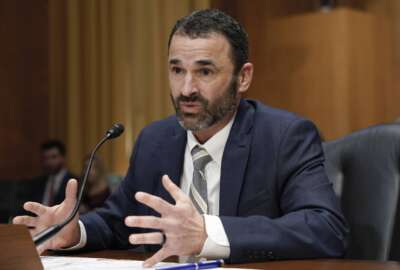Hubbard Radio Washington DC, LLC. All rights reserved. This website is not intended for users located within the European Economic Area.
On Air: Federal News Network
Trending:
IG revokes decision on DoD’s first clean audit
The Defense Department's inspector general has reversed its findings on the Marine Corps' 2012 schedule of budgetary activity, saying the clean opinion it first...
wfedstaff | April 18, 2015 3:40 am
The Defense Department’s inspector general took the unusual step Monday of reversing its findings on a financial audit of the Marine Corps, saying the favorable opinion it issued for fiscal 2012 “is not to be relied upon.”
The reversal is especially significant because the Marine Corps audit was the first clean opinion any Defense Department service had ever received for any significant portion of its financial statements, and was meant to serve as a guidepost for an eventual audit of the entire department’s books. It also carries potential implications for ongoing audits of the rest of the military services.
The IG’s office expunged the audit report from its website and replaced it with a one-page letter explaining that ongoing examinations of more recent years’ financial statements had uncovered new evidence that called auditors’ initial findings into question.
The problems, the letter said, surround previously-unidentified funds being held in Treasury Department “suspense accounts.” The IG said it recently come across evidence “definitively showing” that inflows and outflows of money from those accounts involve Marine Corps transactions that hadn’t been accounted for in the corps’ schedule of budgetary activity (SBA), the document that had earned the clean opinion.
“Because these suspense accounts contain transactions from all DoD components and neither the Defense Finance and Accounting Service nor the U.S. Treasury have the necessary information to accurately assign ownership of the commingled transactions, we are unable to quantify the number of USMC transactions that resided in the accounts and whether those transactions were material to the FY 2012 USMC SBA,” wrote Dan Blair, the deputy inspector general for auditing. “Therefore, our original unmodified opinion is not reliable.”
Blair wrote that his office would revise and reissue the 2012 audit after a closer examination of the newly-uncovered accounts. IG officials did not respond to queries from Federal News Radio about how much work was likely to be involved or how long the process would take.
But resolving those questions is likely to take quite some time, since auditors don’t yet know the number or dollar value of the phantom transactions that evidently have been hiding in Treasury accounts for years.
The Pentagon said Tuesday that it was committed to helping its auditors arrive at definitive answers.
“The Defense Finance and Accounting Service (DFAS) and the office of the deputy chief financial officer are working closely with the DoD IG to discuss the specific issue, perform analysis of the transactions in question and provide additional information to the auditors,” said Cmdr. William Urban, a DoD spokesman. “It is important to realize that this is a natural part of both learning and adjusting to financial audits — for both management and auditors of the department. This action does not undermine or erode the great progress both the Marine Corps and DFAS have made thus far, but it also shows that we need to sustain our efforts and have much work to do.”
Although the SBA audit was only a partial look at the Marine Corps’ overall financial statements — it represented only one year of budget flows ‐ it was a vital step in a more complete audit, known as a statement of budgetary resources (SBR), which covers multiple years. The SBR, in turn, would account for a large majority of financial activity within each military service and the broader department, serving as a major building block of the full financial audit DoD must pass by 2017.
DoD settled on that incremental approach because it would let the department show some progress toward full auditability, while also building the financial management workforce’s understanding of the types of evidence independent auditors require.
But the disclosure of the problems with suspense accounts has potential implications not just for the 2012 Marine Corps audit, but for much of the audit work that’s been performed across the military since then. Under Treasury rules, the accounts are supposed to serve as a temporary, 60-day placeholder for occasional transactions that can’t be immediately reconciled back to their source. But the new IG concerns clearly suggest that significant numbers of transactions have been hiding in those accounts for a period of years. Not only do they lack a clear connection to a credit or debit, they are not traceable to any government agency in particular.
“Nor do I think they can tell which year any particular transaction was from,” said Rep. Mike Conaway (R-Texas), a member of the Armed Services Committee and certified public accountant who has devoted considerable attention to DoD audit issues, in an interview with Federal News Radio. “In any kind of suspense account, you ought to be able to age all of the transactions in there, and attention should have been paid to the older transactions and clear them one way or another. I’m not sure whether it was a lack of resources at DFAS or where the breakdown occurred, but getting the proper codes so they can be processed into the accounts of whoever owns those transactions is just a normal part of accounting. If I were the auditor in this circumstance, I would be asking how they could have multiyear transactions in there that they didn’t know were from multiple years. Why weren’t they getting flushed out?”
Nonetheless, Conaway said he disagreed with the IG’s decision to pull back the original audit, precisely because the number and size of those Treasury accounts remain extremely opaque, and it’s not yet clear that the IG would have arrived at a different conclusion back in December 2013 even if those Treasury accounts had been fully transparent to auditors.
“It’s disappointing that we would have a system that’s still not audited yet. I see this as a learning point,” he said. “It’s definitely a setback, but DoD needs to keep up the hard work. Just because it’s hard doesn’t mean we can’t do it. The folks who have been in the trenches and thought they had a clean opinion are a bit disappointed, but this is not the end of the world. We will find out where these transactions came from, where they need to go, and then move on.”
RELATED STORIES:
DoD plans dry run financial audit for 2015
DoD awards contracts for its first large-scale financial audit
Air Force’s progress raises DoD’s confidence toward audit readiness
Copyright © 2024 Federal News Network. All rights reserved. This website is not intended for users located within the European Economic Area.
Jared Serbu
Jared Serbu is deputy editor of Federal News Network and reports on the Defense Department’s contracting, legislative, workforce and IT issues.
Follow @jserbuWFED





